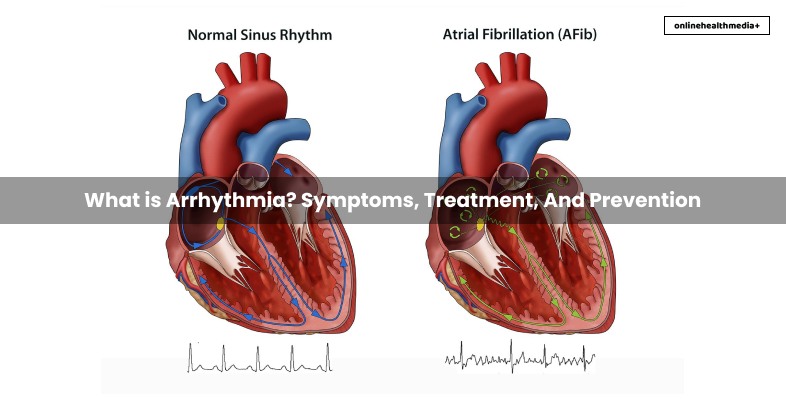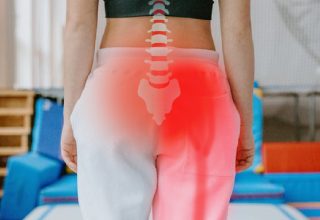What Is Arrhythmia? Symptoms, Treatment, And Prevention
Have you ever heard of Arrhythmia? I am guessing no, but what if I tell you that you have. If the concept of irregular heartbeats rings any bells inside your head, it means you have heard about Arrhythmia. People who suffer from this medical condition usually experience irregular heartbeats – their hearts could beat too slowly, or too quickly, or with a rhythm that’s irregular.
In this article, we will talk at length about this heart condition and explore the intricacies of the same – from symptoms to prevention and treatment. So without wasting any time, let’s dive straight into inconsistent matters of the heart!
All About Arrhythmia: My Heartttt!
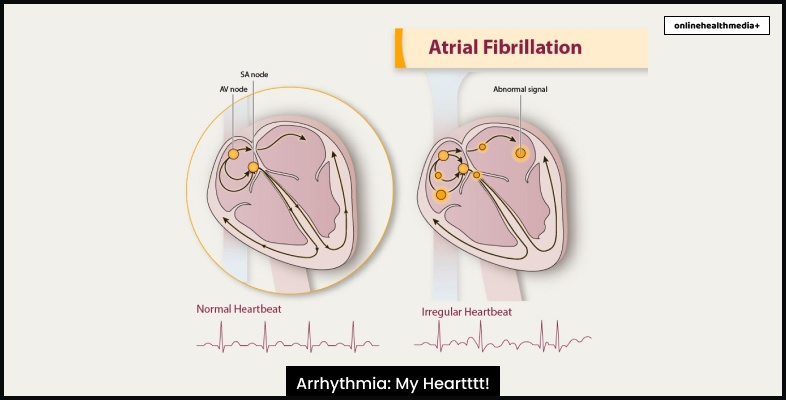
So what is Arrhythmia? Arrhythmia is a heart condition that causes disruptions in the rate at which your heart beats. Simply put, it’s a sort of disorder that causes the heart to beat irregularly – in a manner, electricity essentially works. It usually takes place when the electric impulses responsible for regulating heartbeats stop functioning right.
In this situation, the heartbeats,
- Too quickly
- Too slowly
- Also, too early
- Too erratically
Every cardiac condition mentioned above has a specific name,
- When your heart beats too fast, it is known as Tachycardia.
- When your heart beats too slow, it is known as Bradycardia.
- Also, when your heart beats too early, it is known as Premature Contraction.
- When your heart beats too erratically, it is known as Fibrillation.
Arrhythmia is prevalent amongst 1.5 to 5 percent of the entire population. In most cases, you might feel like your heart is suddenly flattering or even racing, and there are cases where you might not feel any different at all. Sure, it can be totally harmless, but some cases are quite serious. In fact, if it starts interfering with your body’s blood flow, the organs affected in the process will be,
- heart,
- lungs,
- brain,
- some vital organs
Now that you have a fair idea about the whole arrhythmia definition let’s check out the basic difference between Arrhythmia and Dysrhythmia to avoid any confusion in the future.
Arrhythmia And Dysrhythmia: Difference
Since both Arrhythmia and Dysrhythmia are used for signifying irregular heartbeats, most people think they are completely the same. However, they are not entirely the same thing – there’s a slight medical difference between them both.
While both the words more or less mean the same thing – irregular heartbeats. However, while Arrhythmia literally translates to a lack of rhythm, Dysrhythmia means abnormal rhythm. Thus, while one signifies a lack of, the other signifies an abnormal rhythm.
Types Of Arrhythmia:
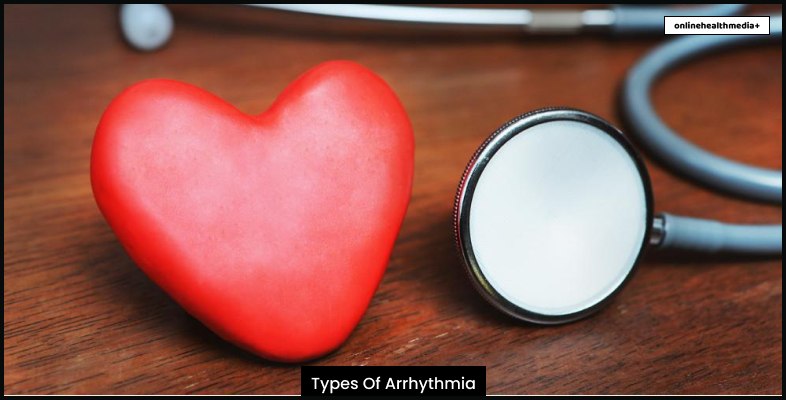
Of course, there are different types of Arrhythmia, and we will tell you about all of them. The different types of Arrhythmia are as follows,
1. Sinus Arrhythmia
Sinus arrhythmia is a medical disorder associated with the Sinus node, a group of disorders related to sick sinus dysfunction. Either this condition can be a part of your body since birth or just develop as a consequent result of some other condition like sleep apnea or even any congenital heart problem.
2. Cardiac Arrhythmia
Cardiac Arrhythmia is a condition where the heart beats irregularly – it could beat too fast or too slow. Mostly, that condition is considered to be harmless, but in some cases, it can get serious if not treated right. If you have already experienced irregular heartbeats of any kind, it’s best to consult medical experts soon.
The different types of Cardiac Arrhythmia (although already mentioned above) are as follows,
- Bradycardia
- Tachycardias
- Ventricular Arrhythmias
- Supraventricular Arrhythmias
- Premature Heartbeat
The Attack Of Arrhythmia: Symptoms
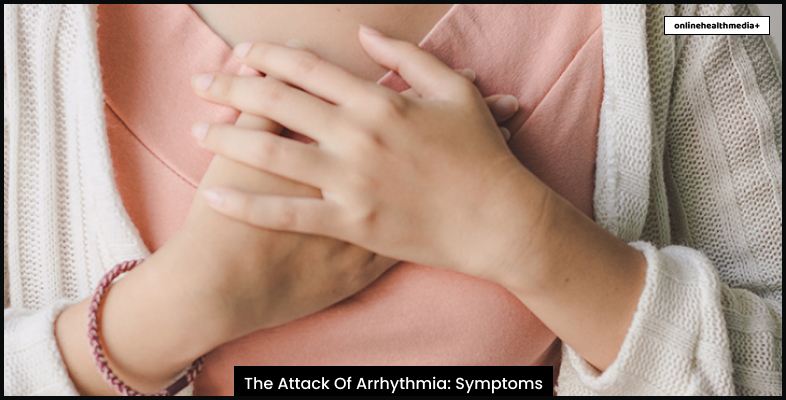
You might or might not face any symptoms of Arrhythmia. However, the most common symptoms of this heart disorder are as follows,
- You might feel like your heart just skipped a few beats
- You might experience a sort of fluttering in your chest or neck
- Also, you might experience rapid heartbeats
- You might also experience irregular or slow heartbeats
If you have ever experienced any of the above-mentioned conditions, the best course of action would be to consult a cardiologist immediately. If you don’t get your heart condition treated immediately on its inception, you might face more serious issues in the long run like,
- Tightness of the chest or pain in the chest
- Difficulty in breathing
- An irregular rate of pulse
- Any kind of weakness
- Lightheadedness or dizziness
- Frequent fainting
- Consistent fatigue
- A lot of sweating
- Palpitations of the heart
- Fall in blood pressure
Our Advice: Seek medical help immediately if you experience any of the aforementioned conditions.
What Does Arrhythmia Feel Like?
As I have mentioned above, many patients suffering from Arrhythmia do not experience any symptoms at all. So you might also be asymptomatic. In that case, you might experience some fluttering in your chest at the most.
But since in most cases you hardly experience anything. That’s why you must always go for regular medical checkups and consultations with your doctor.
Now that you know what the symptoms of Arrhythmia are and how it feels like, you might want to know about the causes. So scroll down for the same!
Causes Of Arrhythmia:
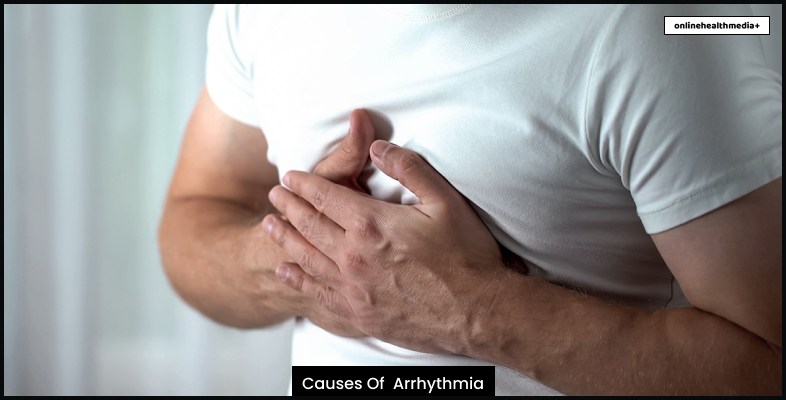
Wondering what causes arrhythmia? Don’t worry we have got you covered. Check out the list of causes below.
- Fever
- Diabetes
- Kidney Disease
- Heart Failure or Heart Attack
- Sleep Apnea
- Any disease related to a coronary artery or heart valve
- Cardiomyopathy
- Endocarditis
- A thyroid gland that’s either underactive or overactive
- Eating Disorders
- Chronic kidney or lung diseases
- Blood pressure issues
Saying Bye To Arrhythmia: Prevention And Treatment

Now that you have figured out everything that you need to know about Arrhythmia, it’s time to find out how you can treat the disease if you already have it. And if you have not experienced the same yet, it’s time to find out how you can prevent your body from getting heart arrhythmia. So keep reading to find out more on the same.
Treatment:

When you seek medical consultation, be prepared to go through several tests before the actual treatment starts. As a result, any doctor will do this to reach an accurate diagnosis conclusion, like the ones mentioned below.
- Your family and medical history
- Physical exam
- A whole range of tests including ECG or electrocardiogram
There will be times when your Arrhythmia would not require any specific treatment at all but that does not mean it won’t require any revaluation. Naturally, if it’s not that serious, your doctor will ask you to,
- Exercise daily
- Eat healthily
- Control the level of cholesterol
- Manage blood pressure
When you start following the points mentioned above, the chances of an attack or stroke will become low.
However, if you have not been diagnosed yet, this is what you can do in case of a sudden attack,
- Soak your face immediate with really cold water
- Coughing
- Gagging
- Hold your breath while you are straining
Other major treatments of the same are as follows,
- Medication, and
- Surgery
Prevention:

There are many triggers that can actually cause Arrhythmia within you like,
Immediately seek medical help if any prescribed medication is causing Arrhythmia in your body – don’t change the course of any prescribed medication without seeking a doctor’s advice first.
Moreover, there are several healthy practices that can also prevent Arrhythmia. These practices are as follows,
- Quit smoking
- Exercising regularly
- Limiting alcohol intake
- Maintain healthy levels of cholesterol and blood pressure
- Tracking healthy levels of BMI
- Eating a healthy – a diet that’s healthy for your heart
- Reducing anxiety and stress
Frequently Asked Questions (FAQs):
1. What Is Arrhythmia Prevention?
There is no fixed way to prevent Arrhythmia. Simply put, a heart-healthy lifestyle is your best shot at preventing your heart from such attacks.
2. What Is The Most Common Treatment For Arrhythmia?
The most common treatment for Arrhythmia is as follows,
- Vagal Maneuvers, and
- Cardioversion
3. How Can I Treat Arrhythmia At Home?
You can treat Arrhythmia by following the steps mentioned below,
- Perform techniques of relaxation
- Reduce intake of stimulants
- Stimulate vagus nerve
- Balance electrolytes
- Stay hydrated
Wrapping Up:
Now you don’t need to wonder what is sinus arrhythmia or what are the causes behind heart arrhythmia since we have covered all the necessary plot points in this respect. Let us know what you think about this article in the comments below!
And don’t forget to keep matters of your heart always healthy!
Read More:
- 10 Ways Chiropractic Care Can Enhance Your Health
- Taking Care Of Your Oral Health In Your 30s
- Meth Use And Sexual Function: How Meth Affects Female Body
